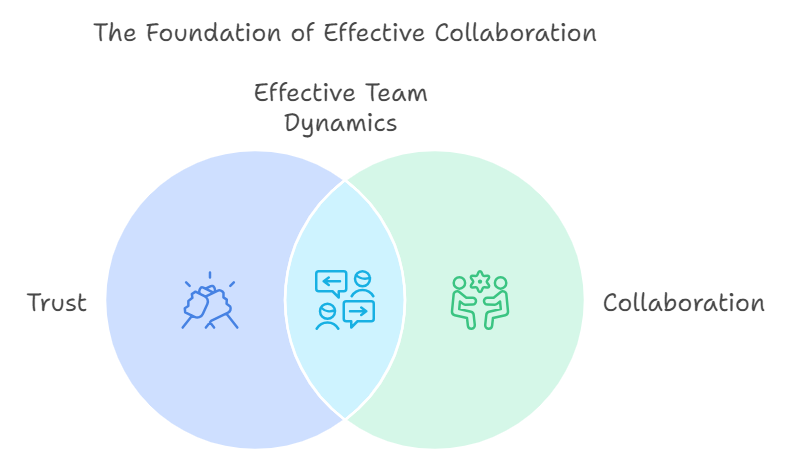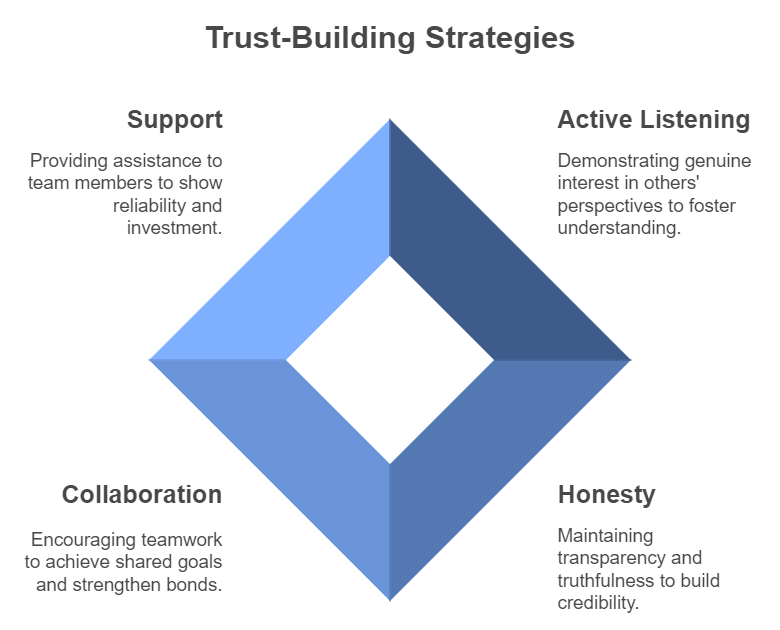Why Trust Is Essential in Collaboration?
Trust is the backbone of any successful professional relationship. Whether you’re brainstorming ideas, addressing concerns, or providing feedback, trust ensures a safe and productive environment where individuals can express themselves openly and confidently. In the workplace, the importance of trust in collaboration cannot be overstated. It leads to:
- Better Communication: People are more likely to share their thoughts and concerns honestly.
- Increased Innovation: Ideas flow freely in an atmosphere of trust.
- Stronger Teams: A culture of trust leads to mutual respect and collective success.
Trust is not just a feel-good factor; it is a strategic asset that empowers organizations to achieve higher levels of productivity and innovation. Studies have shown that high-trust organizations report better employee engagement, reduced turnover, and stronger financial performance.
The Role of Trust in Effective Collaboration

- Comfortable Idea Sharing
In a collaborative setting, team members need to feel comfortable presenting their ideas, no matter how unconventional. Trust fosters psychological safety, which reduces fear of judgment and encourages creativity. A team that trusts each other can experiment with bold ideas, leading to groundbreaking solutions. This highlights the importance of trust in collaboration as a key driver of innovation.
👉 Related Reading: The Role of Psychological Safety in Workplace Collaboration
- Open Feedback Channels
Feedback is essential for improvement, but it can only be effective when both parties trust each other. Trust allows for constructive criticism to be seen as an opportunity for growth rather than a personal attack. The importance of trust in collaboration shines through when feedback is exchanged freely and respectfully, fostering continuous personal and professional development.
- Conflict Resolution
Disagreements are inevitable in collaboration. Trust provides a foundation for resolving conflicts in a respectful and productive manner, ensuring that the focus remains on shared goals rather than personal differences. Teams that prioritize trust can handle disputes constructively, emphasizing the importance of trust in collaboration for maintaining harmony and productivity.
Building Trust in the Workplace
To establish trust within teams, leaders and organizations must prioritize:
- Transparency: Openly communicate goals, expectations, and decisions.
- Consistency: Follow through on commitments to demonstrate reliability.
- Empathy: Show genuine concern for the well-being and perspectives of others.
- Recognition: Acknowledge contributions and celebrate successes.
For example, leaders who consistently involve team members in decision-making processes build a sense of ownership and trust. When employees feel valued and included, they are more likely to trust their peers and managers, creating a cycle of mutual respect and reliability.
👉 Related Reading: How to Build Trust in the Workplace
The Long-Term Impact of Building Trust
Beyond immediate benefits like better collaboration and communication, trust has long-term advantages for organizations. It creates a culture where employees feel a deeper connection to their work and the company. Teams with high trust levels are more resilient in times of uncertainty, enabling organizations to adapt to challenges with confidence.
How Smart Circle Fosters Trust in Partnerships
Smart Circle thrives on fostering trust with its clients and partners. By building face-to-face connections, the company creates an environment where open communication, honesty, and mutual respect can flourish. This commitment to trust enables Smart Circle to deliver customized solutions that meet the unique needs of each client.
For Smart Circle, trust is not just a value—it’s a cornerstone of their operational strategy. The company’s dedication to authentic relationships allows them to create campaigns that resonate with audiences, ensuring long-term success for their clients. This approach emphasizes the importance of trust in collaboration, not just internally, but in all client interactions.
Practical Tips for Building Trust

If you want to nurture trust within your team or organization, consider these practical tips:
- Practice Active Listening: Show genuine interest in what others have to say.
- Be Honest: Even in challenging situations, honesty builds credibility.
- Encourage Collaboration: Foster opportunities for teamwork and shared achievements.
- Provide Support: Help team members when they face challenges, showing that you are reliable and invested in their success.
By embedding trust-building practices into daily interactions, organizations can create an environment where people feel safe to excel and innovate. This reaffirms the importance of trust in collaboration as a cornerstone for success.
Trust Is the Key to Collaboration
In both personal and professional contexts, trust acts as the cornerstone of effective collaboration. It creates a safe environment for innovation, enhances communication, and lays the groundwork for successful teamwork. Organizations that prioritize trust see benefits ranging from increased productivity to stronger employee engagement.
Smart Circle exemplifies the power of trust in business. Their approach to creating genuine, face-to-face connections underscores the importance of trust in collaboration and achieving meaningful outcomes for both clients and their customers.
Investing in trust isn’t just good for relationships—it’s good for business. By emphasizing transparency, empathy, and reliability, companies can lay the groundwork for enduring success.





